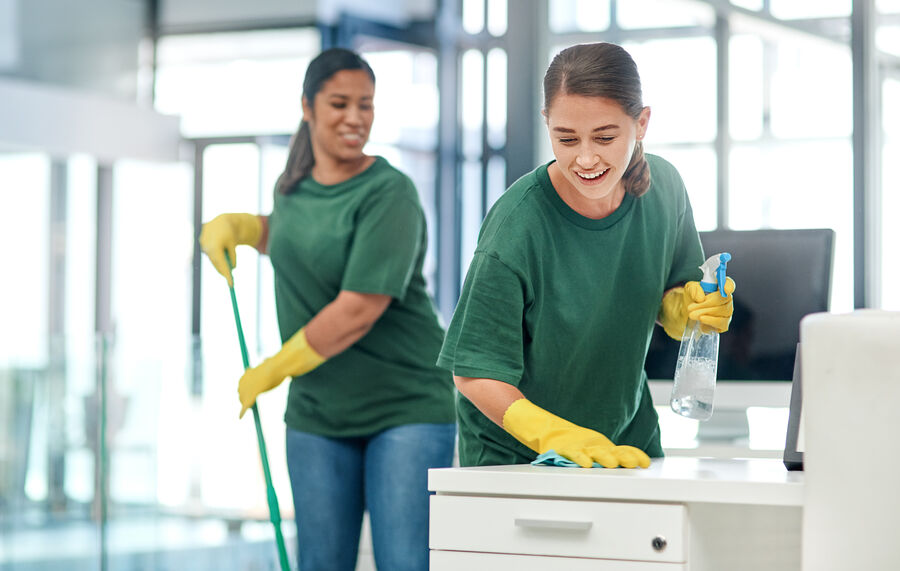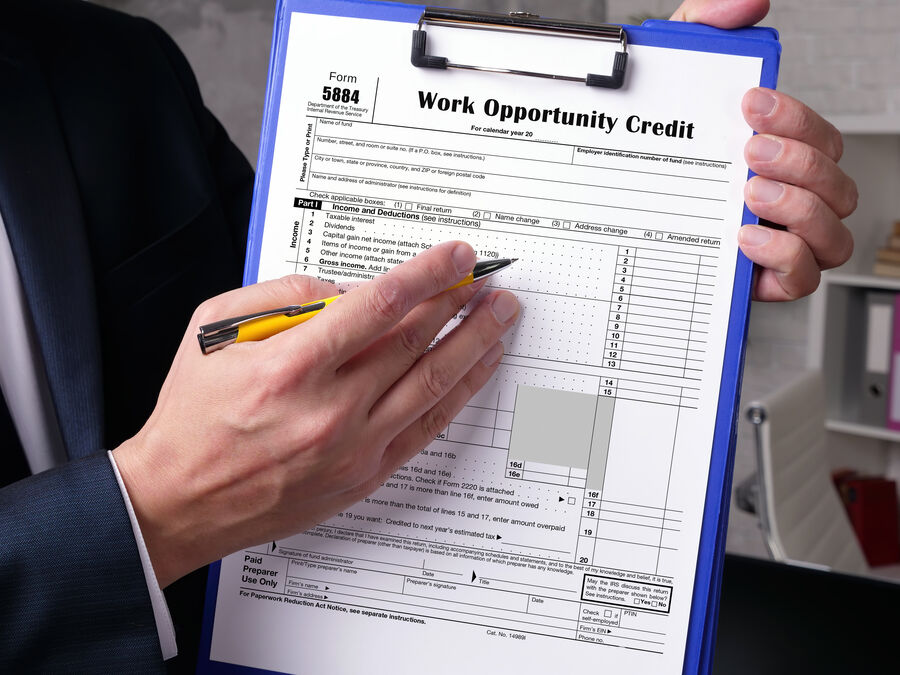
Hiring the right cleaning employees is pivotal for small business owners in the cleaning industry. The success of your business hinges on the reliability, skill, and professionalism of your staff. This comprehensive guide aims to simplify the hiring process, equipping you with the knowledge and tools needed to build a competent cleaning team. You’ll learn how to hire cleaning employees effectively, ensuring they meet your business’s specific needs and standards.
For a quick and easy way to start recruiting a cleaning employee, try our top-recommended job posting website, ZipRecruiter. It streamlines job posting, posting to 100+ job boards with a single click. It also offers templates and in-built prescreening to make your talent search easier. Try it out today for free!
Key Takeaways:
- Target candidates by using industry-specific job boards.
- Running background checks on cleaning employees is a good idea given that they often spend time alone in homes and offices.
- Most cleaning employees are paid around $16.00 per hour.
Step 1: Define Your Cleaning Business Needs
To build a competent cleaning team, small business owners must first define the needs of their cleaning business. Understanding your business’s specific requirements involves identifying roles and responsibilities, determining the needed skills and experience, and establishing clear job descriptions for your cleaning staff.
Start by listing all the tasks and services your cleaning business offers. This could range from general office cleaning and residential cleaning to specialized services, like carpet cleaning and window washing.
For each service, consider the specific roles required. For example, a role might be that of a general cleaner for offices, a residential maid for homes, or a specialist cleaner for carpets and windows. Each role addresses different aspects of your business, catering to various client needs.
Full-time Cleaners vs Freelance Cleaners
Choosing between full-time and freelance cleaners depends on your business’s workload stability and operational flexibility. Full-time cleaners offer reliability and the potential for building a dedicated team aligned with your business’s values and standards. However, they also represent a fixed cost.
On the other hand, freelance cleaners provide flexibility to scale labor up or down based on demand. This can be particularly advantageous for businesses with fluctuating workloads. Keep in mind that you’ll have less control over a freelance cleaner’s schedule than you will with a full-time employee.
For each identified role, pinpoint the skills and experience necessary. Some skills and qualifications to look for include the following:
- Communication: Effective communication is essential for cleaning employees to understand client instructions, work efficiently with team members, and report any issues. Clear communication ensures all tasks are completed to the client’s satisfaction. To assess this skill, consider a role-playing scenario where the candidate must clarify cleaning instructions provided by a mock client and report back on their understanding and planned approach.
- Attention to Detail: Cleaning employees must pay attention to detail to ensure all areas are thoroughly cleaned and no spots are missed. This skill is crucial for maintaining high standards of cleanliness. You can evaluate this by giving candidates a detailed cleaning checklist and asking them to perform a mock cleaning of a designated area. Inspect their work to see how well they followed the checklist and attended to small details.
- Time Management: Efficient time management allows cleaning employees to complete their tasks within the time allotted without compromising quality. Assess this by setting a time limit for a specific cleaning task during the interview and observing how well the candidate manages their time while maintaining thoroughness.
- Experience with Cleaning Equipment and Products: Familiarity with various cleaning tools and products is important to show they know how to use the tools safely and effectively, understanding which products are appropriate for different surfaces. Ask candidates about their experience with specific cleaning equipment and products. You can also have them demonstrate the use of certain tools during the interview.
- Physical Stamina: Cleaning can be physically demanding, requiring stamina and the ability to perform repetitive tasks. Ensure candidates are aware of the physical nature of the job and ask about their ability to handle such work. You might include a practical test where candidates perform typical cleaning tasks to demonstrate their physical abilities.
- Safety and Compliance Knowledge: Understanding safety protocols and compliance with health regulations is essential. Inquire about their knowledge of safety practices, such as handling hazardous materials or operating cleaning machinery. You can also present a scenario involving a safety issue and ask them to explain how they would handle the situation.
Each job description should encapsulate the role, required skills and experience, key responsibilities, and salary range. Be transparent about what the job entails and the expectations. For example, a job description for a specialist carpet cleaner would detail the types of cleaning methods they should be proficient in, specify any required certifications, outline daily tasks, and include physical requirements such as lifting heavy equipment.
Check out our guide on how to create a job description and use our free template. Simply fill out the needed details to create your unique cleaning employee job description.
Example Simplified Job Description for a Specialist Carpet Cleaner:
- Role: Specialist carpet cleaner
- Skills Required: Deep knowledge of carpet cleaning techniques, chemical handling, and stain removal. Certification in carpet cleaning is a plus.
- Experience: Minimum of two years of experience in carpet cleaning with a proven track record. Familiarity with the latest carpet cleaning technologies preferred.
- Responsibilities: Perform detailed carpet assessments, execute various cleaning methods based on carpet type and condition, manage inventory of cleaning supplies, and maintain equipment. Ensure customer satisfaction through excellent service and communication.
- Salary Information: Specialist cleaners, particularly those with certifications and advanced skills, can expect higher wages, potentially ranging from $15 to $20 per hour depending on location, expertise, and reputation within the industry.
Janitors and building cleaners average about $16.84 per hour, while maids and housekeepers earn about $16.08 per hour. Apart from the specific pay rate, consider the type of employee you’re hiring, be it part-time, full-time, or contractual, as this affects how much to pay. Some cleaners can earn commissions or bonuses too, while others expect you to offer certain types of benefits. Consider your budget and needs, then scale the pay from there.
For an easier time deciding on the pay range, use a salary comparison tool—check out our roundup of the best salary comparison tools for some options.
Step 2: Source Candidates
To source candidates effectively for your cleaning business, exploring diverse channels will maximize your reach and attract quality applicants.
- Job Boards: General job boards like Indeed, Monster, and Glassdoor are mainstream options, but don’t overlook niche sites such as CleaningJobs.co, which cater specifically to professionals in the cleaning sector. These platforms allow you to target individuals already interested in and experienced with cleaning work, streamlining the recruitment process. For more options, check out our top recommended job posting websites.
- Local Business Networking: Networking within local business communities presents another valuable avenue for sourcing candidates. Participate in local chamber of commerce meetings, join small business associations, and attend trade shows related to cleaning and maintenance. These events offer the chance to connect with potential hires in person, providing a deeper insight into their capabilities and work ethic than a resume might convey.
- Social Media: Using social media platforms, notably LinkedIn, can also amplify your search. LinkedIn, in particular, allows you to post job listings and search for candidates using specific criteria, such as experience in cleaning or location preferences. Learn more about social media recruiting in our guide.
- Referrals: Referrals stand out as the best option for sourcing candidates. Using a referral program, encourage your current employees to refer people they trust. This not only speeds up the hiring process but often results in hires who are a better fit for your company culture. Offer incentives for successful referrals to motivate your team to recommend quality candidates. This method leverages existing relationships and trust, which can be invaluable in finding reliable and hardworking cleaning staff. Read our guide to learn how to create an employee referral program.
Step 3: Screen Resumes
Screening cleaning worker applicants ensures you hire cleaning employees who are reliable, skilled, and fit well within your company culture. The goal here is to filter through applications to identify top candidates efficiently.
When reviewing resumes, focus on relevant experience and qualifications for cleaning tasks. Look for the following:
- Previous Cleaning Experience: Prior roles in cleaning or maintenance indicate familiarity with the job’s demands, like working for a prior cleaning company or as a maid or housekeeper.
- Certifications: Any professional certifications, such as a Cleaning Certification from OSHA or the International Sanitary Supply Association (ISSA), suggest a commitment to the profession.
- References: Candidates who include references demonstrate confidence in their work history.
- Attention to Detail: Well-structured resumes with no spelling or grammatical errors reflect a candidate’s attention to detail, crucial in cleaning roles.
Step 4: Conduct Interviews & Practical Assessments
First, prepare a list of questions that cover both cleaning techniques and customer service. This dual focus ensures you assess not only the technical ability of the candidates but also their capacity to interact positively with clients.
Questions should be direct and designed to gauge the depth of the candidate’s knowledge and experience. We recommend using a structured interview process so you can evaluate candidates based on their answers to the same questions.
Here are some questions you can ask applicants:
Sample Questions on Cleaning Techniques
- “Describe the steps you take to clean a room efficiently. How do you prioritize tasks?”
- “What’s your approach to handling tough stains on different surfaces?”
- “Explain how you maintain and troubleshoot common issues with cleaning equipment.”
Sample Questions on Customer Service
- “Can you share an example of how you handled a dissatisfied client’s complaint?”
- “How do you ensure client confidentiality and respect privacy while cleaning in occupied spaces?”
- “Describe a time when you went above and beyond for a client. What was the outcome?”
Then, move on to practical assessments that allow you to observe candidates performing actual cleaning tasks, providing insight into their efficiency, attention to detail, and adherence to safety standards. Set up a space where candidates can demonstrate their skills, whether it’s cleaning a small office area or showing how they would handle specific cleaning challenges.
Consider the following when organizing practical assessments:
- Realistic Scenarios: Create scenarios that mirror typical tasks employees would handle daily. This could include cleaning a bathroom, organizing a cluttered area, or removing stains from carpets or upholstery.
- Time Management: Observe how candidates manage their time. Efficient cleaning is as important as thoroughness, especially in a business setting where timing can be critical.
- Safety Practices: Pay attention to how candidates use cleaning chemicals and machinery. Proper handling and safety precautions are vital for preventing accidents and ensuring a safe working environment.
Evaluating Candidates
To evaluate candidates and narrow down the field, compare their performance against the job criteria and your company’s standards. Rate each candidate on a scale for different competencies based on your observations during the interview and practical assessments. This quantitative approach helps in making an objective decision. For an easier time, use an evaluation form—download one of our interview evaluation form templates.
Step 5: Assess Knowledge & Skills
Once you’ve conducted the interviews and practical assessments, it’s crucial to meticulously review your notes to evaluate each candidate’s suitability for your cleaning business. This step is about critically assessing the knowledge, skills, and cultural fit of each potential hire.
Knowledge and Skills to Look For
- Understanding of Cleaning Techniques: Candidates should demonstrate a thorough understanding of various cleaning methods and the ability to apply them effectively.
- Familiarity With Cleaning Products and Equipment: A robust knowledge of different cleaning products, their uses, and safety measures, along with proficiency in handling cleaning equipment, is essential.
- Time Management and Efficiency: Look for evidence of candidates’ ability to manage their tasks efficiently within set timeframes.
- Problem-solving Abilities: The capacity to tackle unexpected issues, like stubborn stains or equipment failure, with sound judgment.
- Attention to Detail: An eye for detail is critical in ensuring high-quality cleaning standards.
Check for Cultural Fit
Cultural fit is as important as skills and knowledge. A candidate who aligns with your company’s culture—its values, work ethic, and team dynamics—will likely contribute positively to the workplace environment. Reflect on each candidate’s attitudes, behaviors, and interactions during the interview process to gauge their compatibility with your company culture.
Step 6: Verify References and Backgrounds
Start by contacting the professional references provided by your candidates. This step allows you to confirm their work history and get an assessment of their reliability directly from previous employers or colleagues.
Ask specific questions related to the candidate’s responsibilities, work ethic, punctuality, and ability to work as part of a team. Here are some examples:
- What were the candidate’s primary responsibilities?
- Can you describe their work ethic?
- How well did the candidate work as part of a team?
- What was the reason for the candidate leaving your company?
- Do you have any concerns about the candidate’s trustworthiness?
- Did the candidate follow company policies and procedures regarding safety?
Step 7: Make a Job Offer
When discussing terms, clarity is key. Begin with a soft offer over the phone, allowing room for negotiation. This conversation should cover salary, anticipated schedules, any potential for overtime, and specific job responsibilities. It’s an opportunity to align expectations and answer any questions the candidate might have. For an easier time, download our employment offer template.
How to Retain Cleaners
Creating a positive work environment is fundamental to retaining cleaners. This involves providing a healthy company culture that focuses on growth and appreciation.
Offer opportunities for professional development to motivate your staff and encourage long-term commitment. Implementing regular training updates and feedback sessions will help keep this initiative on track and on top of your employees’ minds.
Meanwhile, recognizing hard work goes a long way toward fostering a culture of appreciation and boosting morale and loyalty. Check out our guide to employee recognition, where we offer some strategies for keeping employees engaged through effective recognition initiatives.
Frequently Asked Questions (FAQs)
Managing cleaning staff efficiently requires clear communication, setting expectations, and providing the necessary tools and training. Ensure each team member understands their roles and responsibilities by providing detailed job descriptions and on-the-job training. Use scheduling software to assign tasks and monitor progress. Regular feedback and recognition for good work are essential to maintaining high morale and productivity.
Scheduling cleaning clients effectively demands organization and flexibility. Use scheduling software that allows you to visualize your calendar and manage appointments easily. This software should enable clients to book services online, reducing back-and-forth communication. Always allow some buffer time between jobs to account for delays and ensure quality service.
To attract clients to your new cleaning business, establish a strong online presence through a professional website and social media profiles. Invest in local SEO strategies to appear in search results when potential clients look for cleaning services in your area. Networking with related businesses and offering promotions or referral bonuses can also drive initial clientele. Excellent service will encourage word-of-mouth referrals, which are invaluable.
Insurance is crucial to protecting your cleaning business against liabilities. At a minimum, secure general liability insurance to cover any damages or injuries that could occur while cleaning. You’ll most likely also need workers’ compensation insurance to cover any injuries employees suffer on the job.
Implementing a quality control system involves regular inspections, client feedback, and thorough training programs. Develop a checklist of cleaning standards for each job that employees can follow. Conduct surprise spot checks to ensure these standards are met. Encouraging clients to provide feedback after each cleaning can also help identify areas for improvement.
Bottom Line
Starting a cleaning business requires skilled cleaners to support your business plan. By starting off with a solid recruitment structure for finding the best talent in the industry, you’ll find your applicant sourcing and screening process much smoother.
ZipRecruiter can make finding a cleaning employee easier. Place your job post on more than a hundred job boards, and streamline the recruitment process with templates and screening questions. Also, with its smart AI matching technology, you can find qualified applicants in the fastest way possible! Try it out today and make hiring smarter, not harder.





